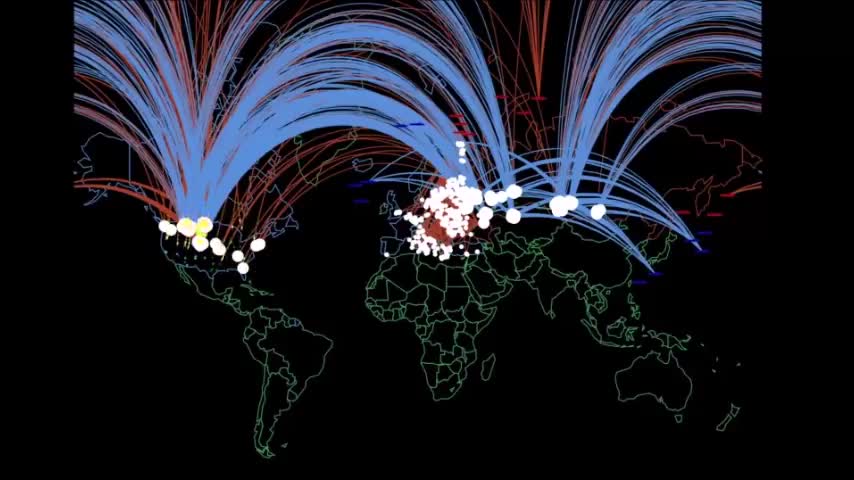Premium Only Content

Nuclear war attack profile
Do You Feel Lucky?
Today there are over 13,000 nuclear weapons in the world, spread over nine countries. Many of these warheads are kept on hair-trigger alert, fully primed and ready to fire on command. Or by mistake.
Why the constant alertness? To guard against surprise attack. The flight time of a submarine-launched missile targeting Washington DC is less than 15 minutes. During that time warning systems must detect the launch and alert the leadership. During those few minutes the president must decide if the threat is valid and respond. That's why nuclear protocols require quick reaction times with no room for doubt or error. Russia's president is under the same time constraints as is the premier of China. Other world leaders with nuclear arsenals work under similar constraints.
Once orders are given, command signals go out to airfields, missile bases and submarines. These military assets might themselves be destroyed in a few minutes, so they must react the moment they get the command. This system is made possible by a complex distributed early-warning and command-and-control network.
Due to the extreme alert level and overall complexity of the system, there have been many false alarms and close calls over the years. These have taken many forms.
Given our simulation involves a Russian attack, here are two example close-calls involving their forces:
On September 26, 1983 Russian defenses detected five incoming ICBMs. In fact these ICBMs were computer-generated phantoms, but the Russians didn't know that. Alarms went off in a command bunker near Moscow. This bunker was the last stop. If it validated the signal then an emergency We-Are-Being attacked message would have gone straight to the Kremlin. The pressure was intense and the system was positive in its assessment of the ICBMs. However the commander of the bunker decided - by instinct - that it was a false alarm. He over-ruled the computers. Had that not happened there was only last step before Russia launched a counter-attack.
Another example. In 1995 Norway launched a meteorological rocket. That was a routine event and the Norwegians informed everyone. Unfortunately not everyone got the memo. The Russians were surprised and their air-defense went on full alert. This meteorological rocket looked like an attack by a US submarine. Launch orders actually reached the desk of the Russian president. Luckily the Norwegian rocket flamed out over the sea and the Russians realized their error.
Lest we think only Russians have problems with nukes, we should briefly note that the United States has had its share of incidents as well. Consider the notorious Damascus Incident. Never was there a better example of Murphy's Law.
A worker was doing routine maintenance at an ICBM silo in Arkansas. He dropped his wrench. The wrench punctured the missile's fuel tank. Fires started and one thing led to another until eventually the missile tried to launch itself. Fortunately only the second stage ignited, which detonated the rocket shortly after liftoff. In this fashion Arkansas failed to incinerate Moscow. However the force of the blast also blew the missile's 9 megaton warhead straight into the air. It landed just outside the base's front gate. Had it exploded it would have irradiated a large part of Dixie. Worse, its impact could easily have led US defenses to believe that an attack was underway.
A dropped wrench, a computer error, some mislaid paperwork - on a planet packed with 15,000 warheads wired to hair-trigger computer systems, it doesn't take much to bring on doomsday.
But as history amply demonstrates, it doesn't necessarily take an accident to start a war. Nine countries have the means to destroy the world. That's an unstable arrangement. Every state must watch every other state, all the time and with never a miscommunication. In such an environment it's easy for a miscalculation or a mistake to get out of hand. Or for an leader to simply make a bad call. The U.S. president, for instance, can order a nuclear attack at any time and for any reason. There are no safeguards. Therefore it's imperative the president be psychological and emotionally stable, as the fate of the planet rests in that person's hands. The same goes for the leaders of the other nuclear powers.
So we live in a world filled with nuclear weapons primed to fire at a moment's notice. Our physical survival demands that no person and no computer ever makes an error. That means our lives are constantly on a knife-edge, one turn of the key away from oblivion. All it takes is bad leadership or a good leader having a bad day. Or a series of unlucky or accidental events. Or simply a random psychopath in the wrong place at the wrong time.
Exipure is an incredible weight loss formula.
Click here ➳ ➵ ➸ ➼ ➽ https://bit.ly/3tEvhws
-
 3:42:37
3:42:37
Barry Cunningham
12 hours agoTHE VATICAN ELECTS A NEW POPE? IS HE GOOD FOR MAGA? AND LOSERS WHINE ABOUT U.K. TARIFF DEAL!
97.1K130 -
 2:59:30
2:59:30
Nerdrotic
1 day ago $8.13 earnedNerdrotic at Night
91.9K5 -
 1:59:21
1:59:21
Man in America
14 hours agoEpstein’s SICK Royal Pedophile Web Unravels—But Where is BONDI?? w/ Ryan Matta
67K20 -
 1:38:39
1:38:39
Glenn Greenwald
11 hours agoGlenn Reacts to Breaking News: American Pope Chosen, Trump and Netanyahu Split Over War with Iran, MAHA Drama, and More| SYSTEM UPDATE #451
228K62 -
 1:52:00
1:52:00
Roseanne Barr
11 hours ago"Oh No!! Ian Carroll???" | The Roseanne Barr podcast #98
125K107 -
 2:08:38
2:08:38
megimu32
9 hours agoON THE SUBJECT: OFF the Rails!
58.2K16 -
 58:12
58:12
Precision Rifle Network
1 day agoS4E15 Guns & Grub Live - Athlon Rangecraft Chronograph
43.1K6 -
 1:01:28
1:01:28
Sarah Westall
11 hours agoToday’s Lunacy Brings a Golden Age of Satire– Laughing our Way to Sanity w/ Donald Jeffries
54.3K5 -
 48:11
48:11
CatfishedOnline
11 hours agoMan Catfished for $200K... We Teach Him a Lesson!
44.9K6 -
 1:01:46
1:01:46
Josh Pate's College Football Show
10 hours ago $1.23 earnedCFB’s Presidential Commission | Bold Prediction Season | Michigan NCAA Investigation | SEC Schedule
41.2K1